- Home
- E. R. Braithwaite
Reluctant Neighbors Page 6
Reluctant Neighbors Read online
Page 6
The London County Council had accepted me on the strength of my academic qualification. They assumed, perhaps with justification from similar appointments, that I knew enough, together with my military experience, to function effectively as a teacher. I shared that view until the first moment of contact with the school and the students. I had imagined them in a classroom setting similar to my own childhood experience—clean, quiet, well-mannered youngsters seated at neat rows of desks, obedient and industrious. In fact I was confronted by a group of rough, untidy, aggressive young adults who made it very clear that they had little use for or interest in academic pursuits. The school provided them with a safe alternative to the streets and harassment from truant officers and the local police, and they intended to enjoy that safety, without interference from myself or any other teacher, until they reached school-leaving age and could “hustle” for themselves.
They greeted my early efforts with sarcastic disdain. When, during the first week, I found occasion to comment unfavorably on the generally poor level of attainment in such basic skills as reading, writing and comprehension, one of them reacted with, “Can I ask you something?”
“Certainly,” I replied.
“Okay, then. They put this school here, right?” He turned to his companions, whose support was immediate and loud.
“Right,” they chorused.
“And they put all these desks and chairs and books and things here. The blackboards and notebooks and everything. Right?”
“Right.” They assented in unison.
“And they pay all you teachers to come here every day. Right?”
“Right.” No word from me. No word expected from me.
“And they make us kids come, because if we don’t they haul our mums and dads up before the law. Right?”
“Right.”
“Okay, then. So the school’s here, and you’re here, and we’re here. But who says we got to learn anything, eh? Who says?”
“Right. Who says?”
I was neither impressed nor bothered by that, because at that time I did not grasp the simple yet profound truths hidden in his argument. It was my job to teach, and I assumed that if I taught, they would learn. But first I had to learn how to teach, in spite of the things they said about me. Deliberately intended to be overheard. Blackie. Chimney Sweep. The Black Knight. Tar Baby. Never in direct address to me, so I took no action. But seeing the parallel, even in that crummy locality, with the same things I’d hated in the well-dressed, soft-spoken members of the interviewing boards. Even these underfed, underhoused, undereducated inhabitants of a social slag heap imagined they could sneer contemptuously at my black skin and the human spirit it housed. And yet, in spite of all that, something was happening to me. I was caught on the treadmill of knowing the rightness of my hatred, seeing it supported all around me, inside and outside the school, yet feeling it undermined and eroded by these same youngsters and myself helpless against the erosion. The way I dressed, spoke and conducted myself interested them, because it was quite different from what they had expected of someone like me. They would ask, “Do people in the country you come from all dress like you do? Are all the people in your country toffs? Are they all very wealthy people, because you look like a wealthy person? Do all the people in your country speak as you do?” In the very nature of their questions something was emerging, their respect for what I represented coming through grudgingly. Because I was so different from what they had imagined black people would be. University graduate. Fighter pilot. Officer.
I would tell them about my country and its people, showing them similarities as well as differences between their lives and ours. And this is where my dilemma really pinpointed itself. The more respect emerged, the more I was forced to respond to it. And it didn’t matter what I did or how I would argue with myself in the quiet of my own room, I could not avoid this. And the other thing which happened at the same time. As this relationship with them developed, I felt the need to talk about it and, naturally it was to Mum and Dad I turned, responding gradually to their unfailing interest in my welfare. I would discuss the classroom happenings with them, and gradually, once again we were talking at home. Mum and Dad and me. It was rather circuitous, perhaps, but necessary. Talking about the children to talk to each other, their love reaching out to me through their simple, matter-of-fact appraisal of the incidents I recounted. And often their comments provided not only encouragement but valuable clues to effective action. Like that incident with Tich Jackson. I’d prepared the lesson carefully. Geography. Covering the course of the Amazon River from source to mouth. The territory through which it flowed and the inhabitants of that territory. Their way of life and the changes through which it had evolved. In brief, I tried by careful research to provide a comprehensive simulated voyage. Illustrated with maps and my own impromptu sketches on the blackboard. Focusing on the children of the territory, their schools, their language, their games and pastimes, their work. Drawing parallels with the East End scene. They were quiet. Attentive I thought. Then a raised hand.
“Yes, Jackson.” Delighted that the question was further evidence of their interest.
“What kind of toothpaste do you use, Sir?” As usual, any digression received unanimous support.
“Yes. Tell us. What toothpaste do you use?” From another.
“Do blackies have to go to the dentist? Me Mum says all blackies have good teeth.” And another.
“I seen some blackies on the flicks and they all had these big white shining teeth.”
“Is it true some blackies eat people? Me dad says that’s why they all have strong teeth.” Laughter.
“Go on, Tich, don’t be daft.” Someone chided him.
“Well, ’s what me dad said.”
On and on, tossing it to and fro among themselves. Myself frustrated and angry at the ease with which the carefully prepared lesson had been shredded into nothingness. Even after I stopped the interplay it was impossible to recapture their interest, so I fell back on the old wasteful standby of having them copy exercises from their textbooks into their notebooks.
At home that night I mentioned the incident. “So what did you do?” Mum asked.
“Nothing I could do. Once they’re launched on that kind of frivolous question game the only thing to do is end it.”
“Why?” she persisted.
“Because they’re not really interested in answers. They’re stupid and try to fit everything to their stupidity.”
“That may be, but your business is to teach them, isn’t it? I think that what happened today was your own fault. So don’t blame them.”
“How do you make that out?” Dad asked her. He, too, was puzzled.
“Look, son, don’t forget that some of those children have never set foot outside London. You were giving them a lesson in geography, weren’t you? Talking to them about South America and the people there. All right. They know that you are from South America, so I suppose while you’re talking to them they’re looking at you. They’re seeing you as South America. You know, when I was a child at school in Bradford I often forgot to listen to what my teacher was saying. I was too busy looking at her clothes and shoes and if she wore any jewelry. I remember one teacher who always wore a lovely cameo brooch at her throat. I could never take my eyes off it, wondering when I would grow up so I could have one like it. Anyway, perhaps it’s the same with your children. While you’re talking to them they’re looking at you, at your shoes, your clothes, your hands, your teeth. Of course, some of them would be listening, too, but even if they’re not, they’re learning by looking.”
“Yes, Mum, but … ”
“Hear me out. You remember how you used to tell us about your boyhood in your own country, and how you and your little friends would go wandering in the woods and cut twigs from the black-sage bush and chew the ends into a tuft which you used to brush your teeth? And how the fine a
sh from a wood fire was great for polishing the teeth? Well, why didn’t you tell the Jackson boy the same thing? That would have shut them up. And after that you could have gone right along with the rest of your lesson. Dad and I always found those things interesting, so why not try it out on the kids? That’s what I’d do. If they wouldn’t hold still for the ordinary textbook stuff, give them a bit of the extraordinary.” And that sweet, nimbly laugh which made it all seem easy and not at all as if she were giving me the soundest advice. Helping me through those difficult, frustrating days and weeks and months, unreservedly. Teaching me how to teach without claiming to do so and teaching me love by loving me. More than that. Her suggestions often worked. The next time someone in the class tried that kind of question I stayed with it, relating it to the topic in hand.
Perhaps my training as a scientist helped in this respect. Anything at all that seemed to work even momentarily, I seized upon and tried to develop, so that at first they were not really lessons for the youngsters. Each one of them was a trial piece whose effectiveness I could then observe. And at the end of each day I would make notes and each week I would look through the whole block of notes to see what worked or what didn’t work, posing myself many questions. Was it the way I gave the lesson? Was it me? Was it the material? I kept these notebooks carefully numbered in sequence. It’s amazing how they accumulated over the years. As my relationship with the class developed positively, as my skill at learning from them, teaching them and holding their attention developed, so what I put into these notebooks changed.
Holding their attention was the thing, and the clue to this I learned from one of them. Another one of those lucky accidents to which I became prone. Mum and my guardian angel helping. It was Mum who advised me to watch my students. “They’re watching every move you make,” she said. “So do the same with them. That way you’ll know what interests them and the best way to teach people is through their interests.” For someone who always claimed to have had no more than a secondary-school education, Mum was wisdom itself. I followed her advice. I watched them. I listened to them. I talked with them. But mostly I listened, in the hope that any bit of information about the lives they led outside the school would help me to understand their conduct in the classroom. After all, I saw them for only about five and a half hours of any school day—their remaining eighteen and a half hours together with every weekend and holiday were spent partly in sleep, but mostly in enthusiastic participation in the less formal but more demanding classroom of the streets, where the arts and crafts of survival were learned under harsh parameters of proficiency and loyalty, and where success and failure were determined by the severe judgment of their peers.
In the playground I often overheard heated discussions or arguments involving rapid mental calculations on monies won or lost, borrowed or lent, spent or saved, from students who, in the classroom seemed paralyzed by the simplest of arithmetic abstractions; lengthy, graphic accounts of local adventures to a spellbound audience from boys and girls who, in the classroom, found great difficulty with the simplest exercise in oral or written prose. In the classroom they were, or preferred to behave as if they were, underachievers; in the playground they became, with hardly an exception, inventive competitors. It seemed to me that if I could arrange some level of transposition of interest from the playground to the classroom we might achieve the first steps in a mutually beneficial relationship.
With this in mind I introduced the following idea. Well, let’s say I first discussed it with Mum, exposing it to the acid test of her special wisdom. With her blessing I laid it on them. Each morning, immediately after registration and before beginning the first assignment, each member of the class would, in alphabetical turn, address the rest of us without interruption, for not less than five and not more than ten minutes, preferably on some aspect of the assignment itself, or, failing that, anything of particular interest to the person speaking. It occurred to me that, in this way, we would each gain some experience in speaking to a group and in listening courteously to a speaker, apart from learning a little more about each other. Because each student knew from his own copy of the class timetable the subject matter of each day’s first assignment, there was the possibility of private research or discussion in preparation for each one’s turn, or, even more important, observations of relevance or otherwise of that particular assignment to that student’s life or interests. As a member of the class I insisted on my right to participate in this activity. In my turn.
At first the students stubbornly resisted the idea, perhaps because of shyness, or a reluctance to be under such formal scrutiny by their peers and myself, or other reasons at which I could only hazard a guess. However, I persisted with it until they reluctantly agreed to try it for a little while, but insisted that I be the first speaker even though my turn should fall late among the Bs. On the morning of my address the first assignment subject was English history covering a period which dealt with the expansion of Britain’s colonial empire. Briefly I spoke to them of British Guiana, my native country and a part of that colonial empire and the fact that, like themselves, I was one of the Crown’s subjects. Keeping my remarks very brief I managed, however, to show them that a study of history was really a study of people and the way in which deliberately or accidentally their lives were interdependent. They listened, and afterwards, during the lesson period, questioned me further, obviously fascinated by a definitive relationship between a textbook of their own historical record, themselves and me.
After many painful, humorous and sometimes embarrassing moments, the idea took hold, especially as it seemed to offer an opportunity for showing off.
One of the more lively personalities, Tich Jackson, armed himself with a beautifully illustrated copy of the National Geographic magazine to give us an hilariously funny address on the peculiar customs of undress favored by the women of an African tribe, when his turn coincided with a geography period on Central Africa. Some of his comments were perilously near the bone as he wondered how some of his classmates, the girls, would fare if they went to such a country and were expected to adopt the local customs. However, we were discovering each other. Through this means I learned something about their homes, parents, relatives and out-of-school activities, their attitudes to their immediate environment and their concerns on approaching adulthood. Many of them soon demonstrated a flair for easy, confident presentation, timing themselves within the minutes allowed.
Potter was a member of my class. Considerably taller and larger than any of the others, he invariably occupied the back-row seat farthest from my table and beside a window which allowed him an unobstructed view of cracked chimney pots, an occasional flight of racing pigeons and an even more occasional flash of blue sky. Like the other boys, he wore blue denims and tee shirt in summer, adding a zippered windcheater in cold weather and kept his hair so close-cropped that the pink scalp extended his broad forehead well beyond the hairline.
My colleagues had briefed me on Potter the first day I joined the school.
“Leave Potter alone,” they advised, “unless you wish him to do some simple chore like moving desks and chairs. If it would do any good we’re sure he’d be happy to move the school a few yards this way or that, singlehanded. But don’t waste your time and his asking him to do anything academic. He’s dimmer than a Toc-H lamp. Good-natured and helpful, but dim. If you insist that he work you’ll only upset him, and if you upset him you get on the wrong side of the others. They all call him Dopey Potts, but consider that their special prerogative. No one else is allowed such liberties. He’s in school waiting out the last months to his fifteenth birthday, then he’s off to work on the docks with his father and will earn more in a week than most of us will see in a month.”
That’s what they told me, many times, but like most of us, I was anxious to please and impress in a new situation, and I did not leave Potter alone. At least not at first.
When asked to read he would dutiful
ly open his book and, red-faced, run the index finger of his right hand across the page, his lips moving soundlessly. The others would exchange knowing glances and smiles, particularly when I’d interrupt the mime to say I could not hear him. It did not help. He remained good-natured, but inaudible. If asked to transcribe notes from the blackboard or textbooks to his own notebooks, he did it in a neat, clear hand, but when the assignment was creative composition he invariably turned in a blank page. The entries in his arithmetic notebooks were a colorful mishmash of simple exercises neatly and correctly done, within a border of multiheaded gnomes, single-engined aircraft and exotic fish. The top of his desk was covered with these intricate doodles. At any caustic comment from me he’d lower his head over his desk, favoring me with an even larger expanse of scalp and remain that way until I turned my attention to someone or something else.
In time, I left Potter alone. In fact it was not difficult even to forget that he was in the classroom, so adept he had become at rendering himself unnoticed. Even at registration each morning he’d not respond to his name other than to look up from his perpetual doodling and smile.
In due course it became Potter’s turn to address us. Usually I placed a tiny red mark against the student’s name on the morning of his address; that was the best way to keep track of our progress, and they soon became interested enough to know the routine and be prepared.

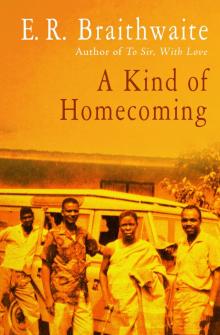 A Kind of Homecoming
A Kind of Homecoming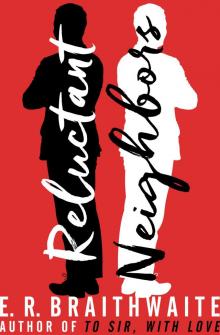 Reluctant Neighbors
Reluctant Neighbors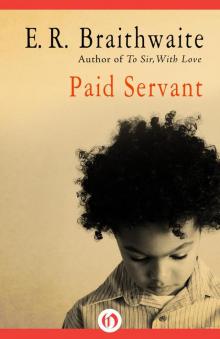 Paid Servant
Paid Servant Billingsly
Billingsly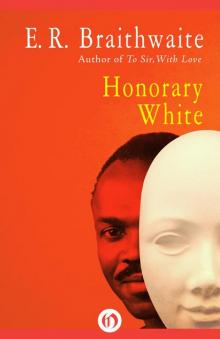 Honorary White
Honorary White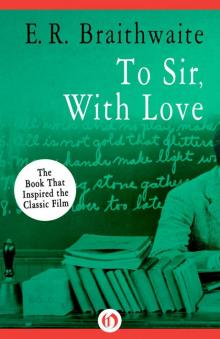 To Sir With Love
To Sir With Love Choice of Straws
Choice of Straws